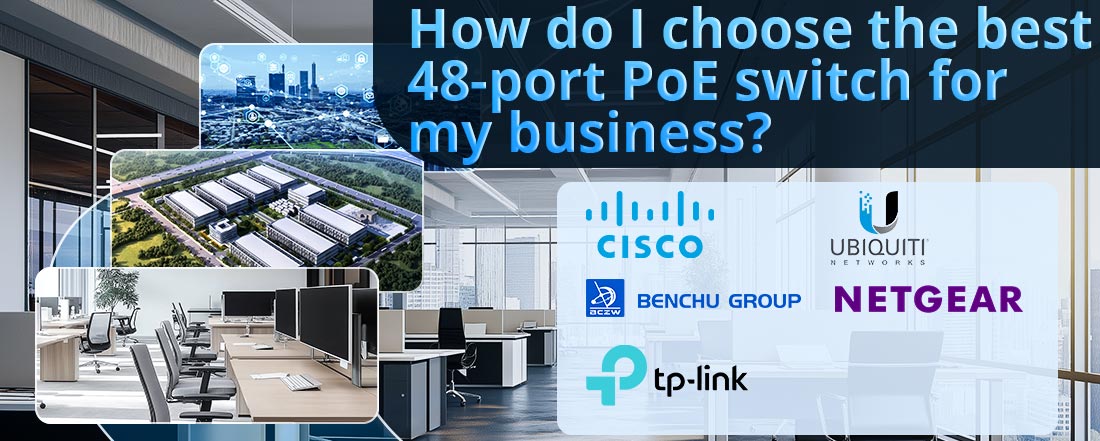
Choosing the best 48-port PoE switch for your business involves evaluating your specific requirements, including power needs, network size, performance expectations, and budget. Here’s a detailed guide to help you make an informed decision:
1. Define Your Power Requirements
PoE Standards: Determine the types of devices you need to power, such as:
--- PoE (802.3af): Up to 15.4W per port.
--- PoE+ (802.3at): Up to 30W per port.
--- PoE++ (802.3bt): Up to 60-90W per port for high-power devices like PTZ cameras or Wi-Fi 6E access points.
Power Budget: Check the total power budget of the switch. For example, a 48-port PoE++ switch with a 720W power budget can power 24 devices at 30W each or 8 devices at 90W each.
2. Assess Network Bandwidth Needs
Gigabit Ports: Ensure the switch supports Gigabit Ethernet (1 Gbps) for fast data transmission, especially if you’re powering bandwidth-intensive devices like IP cameras or access points.
Uplink Ports: Look for high-speed uplinks (10G SFP+, 25G SFP28, or higher) to avoid bottlenecks in the network backbone.
Switching Capacity: The total switching capacity should exceed the combined traffic of all ports. For a 48 port PoE switch, look for at least 104 Gbps capacity to ensure smooth data flow.
3. Consider Management Options
Managed vs. Unmanaged Switches:
Managed Switches: Offer advanced features like VLANs, QoS (Quality of Service), SNMP, and centralized management. These are essential for medium to large businesses.
Unmanaged Switches: Simpler and more cost-effective but lack advanced configuration and monitoring capabilities.
Cloud or Local Management: Some switches support cloud-based platforms (e.g., TP-Link Omada, Cisco Meraki) for remote monitoring and configuration.
4. Look for Enterprise-Grade Features
Layer 2/3 Switching: Layer 3 switches offer routing capabilities, which are beneficial for segmenting networks.
Power Prioritization: Ensures critical devices (e.g., security cameras) get power first during high demand.
Redundancy: Features like dual power supplies or stackability provide failover protection and scalability.
5. Evaluate Compatibility
--- Ensure the switch integrates seamlessly with existing network devices (routers, firewalls, non-PoE devices).
--- Check compliance with industry standards (IEEE 802.3af/at/bt) to avoid interoperability issues.
6. Examine Build Quality and Warranty
Industrial vs. Commercial Grade: Industrial-grade switches are rugged and suitable for harsh environments, while commercial-grade switches are ideal for offices.
Warranty and Support: Look for models with extended warranties, 24/7 technical support, and firmware update guarantees.
7. Analyze Cost Efficiency
Cost per Port: Calculate the cost per port, factoring in features and performance.
Energy Efficiency: Look for switches with power-saving modes (e.g., Energy Efficient Ethernet) to reduce operational costs.
Top Recommendations
Based on features and user reviews, here are some popular options:
1. Ubiquiti UniFi USW-Pro-48-POE: Managed switch with 48 PoE+ ports, 600W power budget, and Layer 2/3 functionality. Ideal for scalable business networks.
2. Cisco Catalyst 9500 Series: High-performance PoE++ switch with advanced security and routing features. Suitable for enterprises with complex networks.
3. TP-Link JetStream T2600G-28MPS: Affordable, managed PoE+ switch with centralized cloud management via Omada.
4. Netgear GS752TP: 48-port PoE+ switch with a 380W power budget, offering reliability for mid-sized businesses.
Conclusion
When selecting a 48-port PoE switch, align your choice with your business’s current and future needs. Consider power budget, network size, device compatibility, and management features. Investing in a high-quality switch ensures scalability, efficiency, and long-term reliability for your enterprise network.